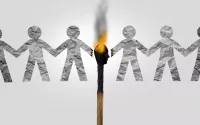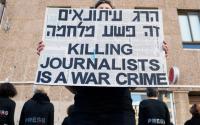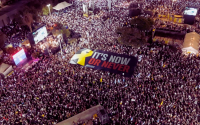Dan Plesch Friday March 21, 2003
"That is not supposed to be happening," said Captain Chris Carter of the US 7th Infantry Regiment after a missile hit the desert near where he and his men were having lunch.
You can say that again. The first hours of this invasion have apparently overturned much of the analysis and spin that I and many others have bought into.
The first attacks would be massive. Not: they were a very limited attack aimed at killing Saddam Hussein.
The first attacks would be at night. Not: the first attacks came at dawn, but then the following day the major ground and air attacks began at dusk. Before events overwhelm our memories of the first day it is worth considering what we knew as we went to bed last night.
The hundreds of bombing missions in the southern no-fly zone have already destroyed Saddam's defences. Not: several missiles hit Kuwait.
"E" bombs will cut out all electric circuits in Baghdad. Not yet.
Special forces would stop Saddam burning the oilfields. Not so: a few oilfields have started to burn.
The war will be quick. Possibly not. President Bush stated yesterday that the war could take a longer time than envisaged.
Are these issues evidence of real problems faced by the US and UK forces or are they just part of the misinformation and chaos of war? We all remember that after weeks of apparent shilly-shallying over the Afghanistan campaign the Taliban collapsed with astonishing speed. But why did the US announce that it was trying to kill Saddam, and why did Bush warn that the "harsh terrain" might make the war last longer than expected?
As I sat in a TV studio trying to make sense of the pictures of sporadic bombing in the early hours of Thursday, followed by the sudden statement by Bush, reports began to appear from CNN, Agence France Presse and other agencies that US officials were briefing that this was an attempt on the "highest levels of the Iraqi leadership".
There was nothing to gain by briefing the press in this way. If Saddam was dead, we would know and rejoice soon enough. If not, then no political harm done. As it is, the failed attack is the news and the first pictures of the invasion are of Saddam thumbing his nose at Bush. Why carry out an attempted execution and allow the TV and radio stations to stand so that Saddam can make his reply? If it was so easy to target Saddam, why was it not done months ago? Not, I think, because George would have been squeamish.
So was this just a straightforward miscalculation? Or, the thought occurs, perhaps it will be easier for American and international opinion to accept the coming devastation now the US has shown that even at the last minute it genuinely tried a truly surgical decapitation. Most likely, it was an example of the now typical overconfidence of his advisers.
So what of Bush's "harsh terrain" warning? He stressed in his address to the American people that the war may not be short. He reminded Americans that Iraq is as large as California and that the troops will have to cross the country, and that will slow things down. The terrain has not changed since it first drafted its invasion plans for Iraq a dozen years ago, so why the warning now?
We have all seen on TV how the vehicles churn up the desert, making the going very tough as the huge armoured vehicles can get stuck. An excellent US map of "off-road" driving conditions in Iraq has been provided by globalsecurity.org. It shows that the area just north of Kuwait is hard going but then there are excellent hard rolling plains to the west of the valley of the Tigris and Euphrates. The US 3rd division is supposed to take this route and turn right after 300 miles towards Baghdad.
But the valley itself is the most difficult to cross. The ground is wet and the soil is soft, cut with countless irrigation ditches dating back to the dawn of civilisation. A couple of main roads running through ancient small towns run north to the capital. The US 1st Marine Expeditionary force with hundreds of tanks, amphibious armoured cars and helicopters is expected to take this route. None of this should have come as news to anyone.
The Americans have long made plans to overcome the terrain problem. US military power is not just in its bombs and tanks but in its ability to fly troops and tanks hundreds of miles behind the front line. These can make a great contribution to a quick victory.
Therefore the US could simply fly airborne troops and marines far closer to Baghdad. By seizing desert airbases with airborne attacks, the US can set up bases far closer to the capital and also use them both to fly in heavy equipment and as jumping-off points for sending forces towards Kirkuk and Mosul.
But there is one major reason for Bush to sound a note of warning. It was only yesterday afternoon that Turkey finally allowed its territory and airspace to be used in the invasion. The extreme delay in being able to open any northern front will have greatly disrupted the invasion plans. Only with this agreement in place was it possible to launch the ground and air offensive last night.
US overconfidence characterised the diplomatic strategy in the build-up to this war. These characteristics now seem to be hindering the material and media management of the war.
* Dan Plesch is a senior research fellow at the Royal United Services Institute
[email protected]http://www.guardian.co.uk/Print/0,3858,4630094,00.html






